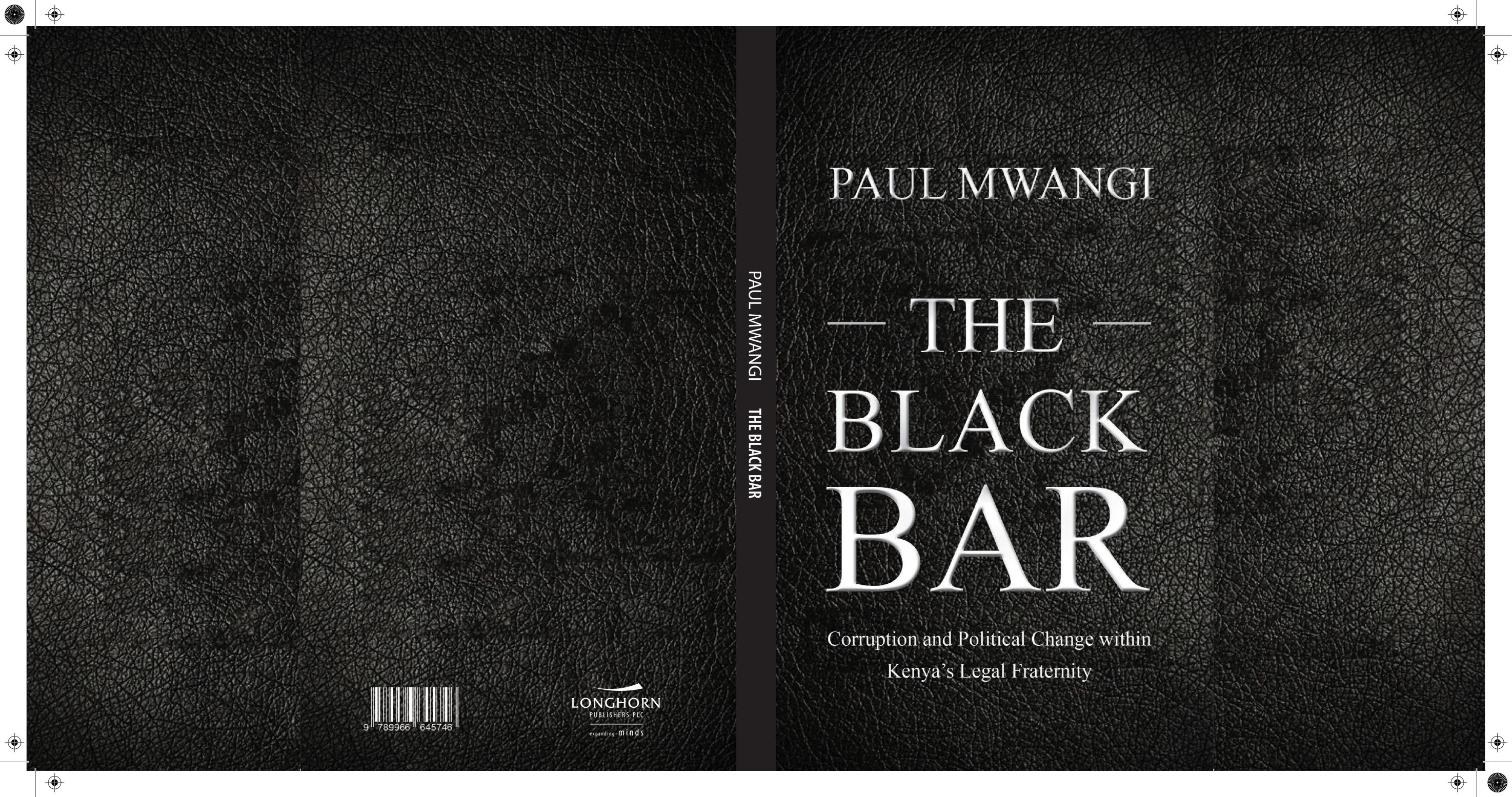

Alongside the National Council of Churches of Kenya, the LSK emerged as a credible voice for human rights, while the government did all it could to either infiltrate and co-opt it or suppress it through lawfare and brutality.
According to Paul Mwangi’s ‘The Black Bar: Corruption and Political Change within Kenya’s Legal Fraternity’, first published in 2001 and reprinted this year, the legal profession endured hell from the hands of then-President Daniel Moi’s Kanu administration.
Here are excerpts from the book.
The Fall of the Black Bar
Chapter 7
An honest politician, said one American Republican, is one who when bought will stay bought. Therein lies one difference between honest lawyers and honest politicians. It came to be the cause of renewed hostilities between the LSK and President Moi. When President Moi buys, he buys mind and soul. His faithfuls neither see, hear nor say anything against Moi.
Before the truce between Moi and the LSK was called in mid-1981, one of the leaders of the Black Bar, Dr. John Khaminwa, led the first challenge to Moi’s Presidential powers. He was arguing a case in which the Deputy Director of Intelligence, Mwangi Stephen Muriithi, had sued the Attorney-General challenging Moi’s powers to sack him. Khaminwa argued that as Muriithi was employed by the Public Service Commission, he could not be dismissed unless disciplinary proceedings were instituted before the independent PSC. But another section of the Constitution said that the President could dismiss any civil servant at his pleasure. This section, Dr. Khaminwa argued, was subordinate to the protection of civil servants under the PSC and if effected, could nullify that protection. In any case, he argued, the letter dismissing Muriithi had been signed by the Chief Secretary and not the President.
Muriithi was another victim of the Kalenjinisation of the Kenyan Society. When Moi assumed the Presidency in 1978, the top item on his agenda was to weed out the previously invisible Kikuyu people from the society and to put in their place his own Kalenjin tribesmen. He believed that the Kalenjin should be the new aristocracy and that the Kikuyu should be driven out of the privileged position they had held during the Kenyatta era.
It was not easy for Moi trying to fight a class of people who were extremely wealthy and powerful. Thus he handled the matter cautiously, scheming wisely, and destroying one person at a time. Where the Kikuyu person in question held a sensitive or powerful position in government, Moi subordinated him to a Kalenjin who would slowly sap power from the prey until it was possible to retire him without consequence. Such was the position of the Director of Intelligence, Mr. Kanyotu, and hence the need to replace his deputy, Muriithi, with a Kalenjin. But Muriithi was no pushover.
It was a very embarrassing litigation for President Moi. Kenyatta had dismissed civil servants without anyone daring to challenge him. But Kenyatta was not the kind of dictator who one could take to court. He was the kind of President who, in a fit of senile indiscretion, called Parliament buildings and instructed the Speaker to initiate immediate use of the Kiswahili language in the debates. His instructions were followed without query, despite the fact that the Constitution only allowed for the use of English. By taking Moi to court, Muriithi was also expressing an opinion of Moi as President.
Moi may be described, in Percy B. Shelley’s words in Rosalind and Helen, as a coward to the strong and a tyrant to the weak. He did not have the courage to move in against Muriithi until the High Court upheld his powers of dismissal. In the judgement of Justice Hancox, the Constitution intended that the President should enjoy the same powers of dismissal as the English Monarch did under a royal prerogative. Immediately after the judgement was read, Muriithi and his lawyer, Dr. Khaminwa, were arrested and detained without trial.
Dr. Khaminwa was also engaged in another challenge of Moi’s powers. He was acting for one of Kenya’s most radical and spitfire socialist politicians, George Moseti Anyona. Anyona had been detained by Kenyatta in 1977, picked up from the precincts of Parliament by plain-clothes policemen. He had presented evidence in the House that the Attorney-General Charles Njonjo had influenced the cancellation of tenders worth £50 million in railway equipment, which had been awarded to an international firm and secured the tenders for a British firm. Anyona wanted a Parliamentary Select Committee to investigate the award to the latter firm.
When he was released from detention by Moi after Kenyatta’s death, Anyona found he had no place in the monolithic KANU party. In 1982, in concert with the father of opposition in Kenya, Jaramogi Oginga Odinga, he sought the registration of a socialist party to compete with KANU. Moi had him arrested and detained, and also had Odinga placed under house arrest. Khaminwa went to court challenging the detention. In the meantime, Moi had inserted in the Constitution a new Section, Section 2A, which declared KANU the only legitimate political party in the country. The Constitutional Bill was passed, with 158 yes and no dissenting vote.
The LSK reacted strongly against the new developments. It condemned the detentions, regretting that Moi had gone back on his word that there would be no more detentions without trial in the country. In particular, it regretted that Dr. Khaminwa had been detained for discharging his professional duties for this was an interference with the independence of the Bar. Section 2A was not spared. The LSK expressed its reservations about the section, seeing it as a derogation of the freedom of democratic choice, and urging that a referendum be held to seek the views of the Kenyan citizens on the matter. These anti-government reactions were occurring barely two months after the truce between the LSK and President Moi. Moi felt betrayed. No friend of his criticised any of his actions. His view that lawyers were turn-coats was speedily bearing upon his mind as they continuously reacted against his increased tyranny.
The breaking point came after the attempted coup on August 1st 1982. Moi expected such sympathy from the lawyers as to dose their eyes as he broke down all laws to get at the devil. But when the court martials began, the members of the Black Bar became actively involved in the defence of the mutineering soldiers by lodging appeals in the High Court. They also challenged the post-coup detentions, especially that of another of their professional colleague Willy Mutunga. To Moi, this had nothing to do with independence of the Bar. It was crystal clear apostacy.
President Moi turned against the Black Bar. He developed an enduring hatred for lawyers and all they stood for; constitutionalism and the rule of law. Using the media, he began to insult lawyers in unsavoury language, saying they were local agents of foreign masters abroad and criticising them for believing they were the only thinking Kenyans.
On July 3rd 1986, he detained a law student, Gacheche wa Miano, for his political views. On October 8th 1986, he detained Wanyiri Kihoro, a lawyer, for suing the government for torture and illegal detention. Kihoro had been held and tortured for three months. He was held in detention until July 1st 1989. On December 22nd 1986, he detained lawyer Mirugi Kariuki on grounds that he was a member of Mwakenya, an illegal organisation set up to end the Moi regime. On March 6th 1987, he detained the 1988 Robert F. Kennedy Human Rights Award winner, Dr. Gibson Kamau Kuria, also on grounds of belonging to Mwakenya. Two days prior to his detention, Kuria had given the Attorney-General notice of intention to sue the government on behalf of two detainees. Both Mirugi Kariuki and Kamau Kuria’s offices and residential houses were searched without a warrant and both were tortured while in detention.
Ironically, the words of Professor Yash Ghai and MacAuslan were applying to the Black Bar. They had said of the White Bar that unless it can convince a significant number of people that it can perform important services for the community, it will fail to obtain the support it needs to resist ... encroachments of the government ... “While the Black Bar had since its emergence identified with the aspirations of Kenyans, it was deteriorating in performance and speedily losing sight of its ideals and aspirations.”
***
Readers can order and/or buy The Black Bar at:
1. Nuria Books
0794 233 261
2. LawAfrica
0723 413 744
3. Amazon https://www.amazon.com/Black-Bar-Corruption-Political-Fraternity-ebook/dp/B0FL2H8BRZ/ 4. Price of book - Sh1,500/-
© Paul Mwangi, 2025













